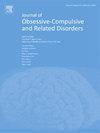Associations among fear of self, family acceptance, and scrupulosity symptoms in the LGBTQ+ community
IF 1.5
4区 医学
Q3 PSYCHIATRY
Journal of Obsessive-Compulsive and Related Disorders
Pub Date : 2025-10-01
DOI:10.1016/j.jocrd.2025.100981
引用次数: 0
Abstract
Extant research suggests that LGBTQ+ individuals may be especially susceptible to experiencing obsessive-compulsive (OC) symptoms within the unacceptable thoughts symptom dimension. The current study sought to replicate and extend these findings by examining whether LGBTQ+ individuals report greater unacceptable thoughts and scrupulosity symptoms (religious- and/or moral-based symptoms) than do non-LGBTQ+ individuals. To further understand these experiences among LGBTQ+ individuals, we also examined the relations among OC symptoms and factors we hypothesized to be uniquely relevant: religiosity, fear of self, and family acceptance of LGBTQ+ identity. MTurk participants completed a battery of questionnaires. Results indicated that LGBTQ+ participants reported significantly higher scrupulosity and unacceptable thoughts symptoms than did non-LGBTQ+ participants. Notably, LGBTQ+ participants also reported significantly higher scores on other OC symptom dimensions than did non-LGBTQ+ participants. LGBTQ+ identity was significantly related to scrupulosity symptoms when controlling for religiosity and fear of self. In the LGBTQ+ sample, family acceptance of LGBTQ+ identity moderated an association between religiosity and scrupulosity symptoms. These results suggest that identity, family acceptance, and religiosity are meaningfully associated with OC symptoms in LGBTQ+ individuals. This line of research remains relatively nascent but should be a focus of efforts to better understand and eventually mitigate OC symptoms in the LGBTQ+ community.
LGBTQ+群体自我恐惧、家庭接纳和谨慎症状之间的关系
现有的研究表明,LGBTQ+个体可能特别容易在不可接受的思想症状维度中经历强迫症(OC)症状。目前的研究试图通过检查LGBTQ+个体是否比非LGBTQ+个体报告更多的不可接受的想法和谨慎症状(基于宗教和/或道德的症状)来复制和扩展这些发现。为了进一步了解LGBTQ+个体的这些经历,我们还研究了OC症状与我们假设的唯一相关因素之间的关系:宗教信仰、自我恐惧和家庭对LGBTQ+身份的接受程度。土耳其的参与者完成了一系列问卷调查。结果表明,与非LGBTQ+参与者相比,LGBTQ+参与者报告了明显更高的谨慎和不可接受的想法症状。值得注意的是,LGBTQ+参与者在其他OC症状维度上的得分也明显高于非LGBTQ+参与者。在控制宗教虔诚和自我恐惧的情况下,LGBTQ+身份与审慎症状显著相关。在LGBTQ+样本中,家庭对LGBTQ+身份的接受程度调节了宗教虔诚度和谨慎症状之间的关联。这些结果表明,身份、家庭接受度和宗教信仰与LGBTQ+个体的OC症状有意义的关联。这方面的研究仍处于起步阶段,但应该成为更好地理解并最终减轻LGBTQ+社区中OC症状的重点。
本文章由计算机程序翻译,如有差异,请以英文原文为准。
求助全文
约1分钟内获得全文
求助全文
来源期刊
CiteScore
4.00
自引率
5.60%
发文量
46
审稿时长
47 days
期刊介绍:
Journal of Obsessive-Compulsive and Related Disorders (JOCRD) is an international journal that publishes high quality research and clinically-oriented articles dealing with all aspects of obsessive-compulsive disorder (OCD) and related conditions (OC spectrum disorders; e.g., trichotillomania, hoarding, body dysmorphic disorder). The journal invites studies of clinical and non-clinical (i.e., student) samples of all age groups from the fields of psychiatry, psychology, neuroscience, and other medical and health sciences. The journal''s broad focus encompasses classification, assessment, psychological and psychiatric treatment, prevention, psychopathology, neurobiology and genetics. Clinical reports (descriptions of innovative treatment methods) and book reviews on all aspects of OCD-related disorders will be considered, as will theoretical and review articles that make valuable contributions.
Suitable topics for manuscripts include:
-The boundaries of OCD and relationships with OC spectrum disorders
-Validation of assessments of obsessive-compulsive and related phenomena
-OCD symptoms in diverse social and cultural contexts
-Studies of neurobiological and genetic factors in OCD and related conditions
-Experimental and descriptive psychopathology and epidemiological studies
-Studies on relationships among cognitive and behavioral variables in OCD and related disorders
-Interpersonal aspects of OCD and related disorders
-Evaluation of psychological and psychiatric treatment and prevention programs, and predictors of outcome.

 求助内容:
求助内容: 应助结果提醒方式:
应助结果提醒方式:


